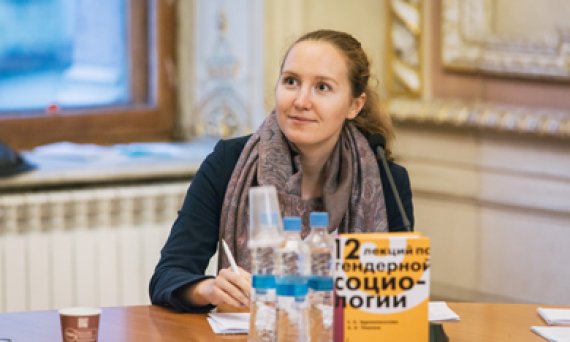On November 14th, the session “Experts in Sexuality: Scientific, Legal, Everyday, and Economic Versions of Sex” was held as part of the VDNH-9 conference. Participants discussed discourses of power that form knowledge about sexuality in contemporary society.
The session began with a presentation by Antu Sorainen (University of Helsinki) on expert knowledge in relation to inheritance rights and wills in homosexual relationships. Such studies of legal structures are important because they form a new understanding of how the intimate economy of family and kinship structures is organized for homosexual citizens and/or partnerships.
Sorainen’s research included interview with all stakeholders—with testators and lawyers who are involved in drafting documents. Through several case studies, the researcher showed various intricate systems of inheritance that may be configured through new systems of familial and kinship relations.
Dmitry Isaev spoke about the significance of binary oppositions in the discourse of power. According to him, conservative oppressive discourse is based on maintaining a system of binary oppositions, as power operates not on punishment, but on normalization and control.
Maintaining normativity—including gender and sexual—involves the propagation of essentialist categories and fixing social constructs as natural. The deconstruction of a binary gender model threatens to destroy the fundamentals of dominant conservative discourse that appeals to the essentialist paradigm of “ordinary” consciousness and bring forth a fundamental (liberal) revolution, in which the backbone is individual variation and creativity.
Veronika Lapina (PhD student, EUSP) spoke about how queer subjectivity is being realized in Russia, understanding space and time not as context but as creative forces in this production. Drawing on a queer reading of the Bohr model and the quantum mechanics of the Copenhagen school, she believes that it stands to abandon an understanding of time as the binary opposition of “past-future,” and transition to a less snug narrative of time in which the assembling and reassembling of queer subjectivity is produced from the interaction of multiple temporalities that contribute to queer becomings.
Alisa Zhabenko (PhD student, University of Helsinki) spoke about motherhood in lesbian families, having shown in her own empirical studies how approaches to reproductive behavior differ in various generational cohorts of homosexual women. For example, lesbians of an older generation associate motherhood with heterosexual marriage and/or single-parent families, whereas younger women are involved in a system of new reproductive practices such as insemination and in vitro fertilization, as well as the creation of a new model of extended families.
Alexander Kondakov (EUSP, CISR) concluded the session with his presentation titled “Experts in the Field of Non-Traditional Sexual Relations.” He posed an intriguing question: to what extent is it ethical to analyze the texts of colleagues in terms of the production of homophobic narratives? He showed which experts are engaged by Russian courts to adjudicate on issues of the so-called “gay propaganda,” and how “expertise” has become a tool of nationalistic domestic policy and represents homophobic discourse in the public sphere.
Veronika Lapina


















